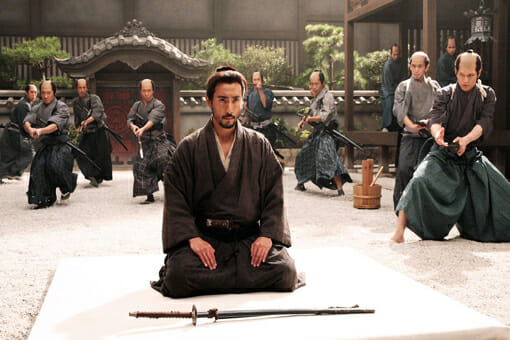By Monica Terada · July 23, 2012

Six smothered beats of a bleeding samurai’s heart reverberate and cry out within the screens, tightly engulfing my rigid soul: family, tradition, loss, honor, revenge, and hypocrisy, are major themes in Takashi Miike’s Hara-Kiri: Death of a Samurai. This aesthetically impeccable movie meticulously explores the irony in the life of an honorable Samurai, Hanshirô Tsugumo (Ebizô Ichikawa).
In feudal Japan a period of peace reigns throughout the country, therefore it dismantles its armies and leaving its samurais jobless and with no one to serve. It is within this context that we meet the poverty-stricken, yet respectable Hanshirô. Throughout the beautifully composed scenes of the movie we fall in love with Hanshirô’s simplicity in life; although impoverished, he has found happiness next to his daughter, Miho (Hikari Mitsushima), son-in-law, Motome Chijiiwa (Eita Nagayama), and newly born grandson, Kingo.
However, happiness is transitory: Hanshirô’s daughter and grandson are suddenly taken ill and the family’s fate changes dramatically. In a desperate attempt to acquire money in order to help his sick wife and child, Montome, seeks the house of a Japanese lord, Kageyu (Kôji Yakusho) and claims to want to commit hara-kiri, a respected suicide ritual reserved solely for samurais. What follows is one of the most spectacular movie scenes I have ever seen in my life.
There are so many hidden messages of irony floating throughout the entire movie. For instance, it is with the commencement of spring that the misery surrounding the samurai’s family reaches its peak and Hanshirô delivers the heartbreaking line: “I was simply living my life, waiting for spring…”
Hanshirô’s samurai principals are in constant contradiction with his love for his family. Out of honor and respect for his sword, he refuses to sell his blades to help his sick daughter, and, when his son-in-law, Montome, begs Kageyu to lay aside his disciplined principles for just one day (an entreaty for mercy), the Japanese lord is devoid of empathy—incapable of showing an ounce of pity for the desperate young man. It is more important to honor a sword than life itself. Even in the very last line of the film is this sentiment clung to: “the red armor is the pride of the house”.
To be honest, I have nothing but a world of praises to offer this movie. First of all, you would have to be insane not to find the cinematography absolutely perfect. Each scene is flawlessly composed to match the characters’ and movie’s heavy feel. The movie begins by exploring the superficial, small details of life’s beauty but reveals that within that lies, an obscure hidden abyss of hypocrisy.
The soundtrack is unbelievable: even the sound produced by the characters’ careful steps on the little rocks in the Japanese lord’s house is brilliant. Not to mention the enrapturing grand piano playing in the background.
Furthermore, a superb acting performance from every single actor in the movie deserves recognition. Although everything is aesthetically beautiful, our characters are profound, revealing dark aspects of human nature. Congratulations to the screenwriter, Kikumi Yamagishi, for doing his homework clearly! With these profound, real, three-dimensional characters whom we immediately love and empathize with, the movie magic spell is cast and our souls are bewitched: we’ve become a part of their world. And isn’t that the ultimate goal of every screenwriter?
The skilled craftsmanship behind and in front of the camera makes it impossible not to watch this movie with a distressed heart. But it is surely well worth the pain—a genuine piece of art: prefect in every sense of the word.